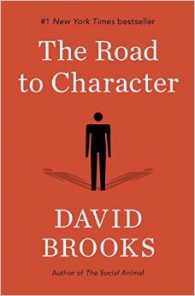Whatever happened to “sin”?

David Brooks has been described as a “cultural Jew.” But it would be a mistake to think that this New York Times columnist is just another secular journalist. In articles, speeches, interviews and a recent book, Brooks describes his ongoing spiritual journey not as a mid-life crisis but as a profound awareness that he has not become the person he wanted to be—a confession he makes with some sadness.
He concedes that he has “achieved a decent level of career success” while confessing a lack of “generosity of spirit” and “depth of character”—characteristics he would love to possess. To achieve this sort of moral development, he concludes that he will “have to have the sort of moral adventures that produce that kind of goodness.”
We all know that the eulogy virtues are more important than the résumé ones. But our culture and our educational systems spend more time teaching the skills and strategies you need for career success than the qualities you need to radiate that sort of inner light. Many of us are clearer on how to build an external career than on how to build inner character.
But if you live for external achievement, years pass and the deepest parts of you go unexplored and unstructured. You lack a moral vocabulary. It is easy to slip into a self-satisfied moral mediocrity. You grade yourself on a forgiving curve. You figure as long as you are not obviously hurting anybody and people seem to like you, you must be O.K. But you live with an unconscious boredom, separated from the deepest meaning of life and the highest moral joys. Gradually, a humiliating gap opens between your actual self and your desired self, between you and those incandescent souls you sometimes meet.
It is easy and probably not inaccurate to interpret these observations in the context of St. Augustine’s famous quote, “You have made us for yourself, and our hearts are restless, until they can find rest in you.” After all, Brooks told a Christianity Today interviewer that “Augustine is quite simply the most capacious mind and intelligent man I’ve ever encountered.”
Perhaps, Augustine has also informed Brooks’ thinking about sin since he holds that sin originates in “depraved human nature.” In his new book, The Road to Character, Brooks provides a very insightful analysis of the cultural consequences of losing such morally weighty words as “sin” — “to talk about the deepest affairs of the heart, only words like sin, soul, redemption really work.”
Today the word sin has lost its power and awesome intensity. It’s used most frequently in the context of fattening desserts. Most people in mainstream conversation don’t talk much about individual sin. If they talk about human evil at all, then that evil is most often located in the structures of society—in inequality, oppression, racism, and so on—not in the human breast.
We’ve abandoned the concept of sin because we’ve left behind the depraved view of human nature. In the 18th and 19th century many people really did embrace the dark self-estimation expressed in the old Puritan prayer, “Yet I Sin”: “Eternal Father, Thou art good beyond all thought, but I am vile, wretched, miserable, blind. . . .” That’s simply too much darkness for the modern mentality.
But sin, like vocation and soul, is one of those words it’s impossible to do without. Sin is a necessary piece of our mental furniture because it reminds us that life is a moral drama. No matter how hard we try to reduce everything to deterministic brain chemistry, no matter how hard we strive to replace sin with nonmoral words, like mistake or error or weakness, the most essential parts of life are matters of individual responsibility and moral choice: whether to be brave or cowardly, honest or deceitful, compassionate or callous, faithful or disloyal. The person struggling against sin understands that each day is filled with moral occasions.
In places like Abilene, Kansas, the big sins, left unchallenged, would have had practical and disastrous effects. Sloth could lead to a failure of a farm; gluttony and inebriation to the destruction of a family; lust to the ruination of a young woman; vanity to excessive spending, debt, and bankruptcy.
In places like that, people not only had an awareness of different kinds of sin, but of the different remedies for each. Some sins, like anger and lust, are like wild beasts. They have to be fought through habits of restraint. Some sins, like mockery and disrespect, are like stains. They can only be expunged by apology, remorse, restitution, and cleansing. Some sins, like stealing, are like a debt. They can only be rectified by repaying what you owe to society. Some sins, like adultery, bribery, and betrayal, are more like treason than crime; they are affronts to the social order. The social harmony can only be rewoven by slowly recommitting to relationships and rebuilding trust. Some sins, like arrogance and pride, are a perverse desire for status and superiority. They can only be addressed by those willing to humble themselves before others.
When modern culture tries to replace sin with ideas like error or insensitivity, or tries to banish words like virtue, character, evil, or vice altogether, that doesn’t make life any less moral. It just means we think and talk about these choices less clearly, and become increasingly blind to the moral stakes of everyday life.
The first two quotes above come from “The Moral Bucket List,” a column published by The New York Times on April 11, 2015.
The second and longer quote is from The Road to Character, just published in April of this year.


 May 28, 2015
May 28, 2015 







Comments are closed.